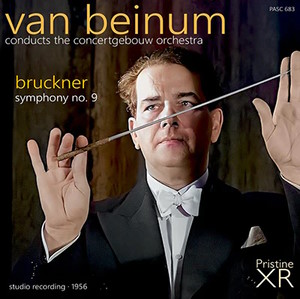
Anton Bruckner (1824-1896)
Symphony No. 9 in D minor (1894 original version, ed. Nowak)
Concertgebouw Orchestra of Amsterdam/Eduard van Beinum
rec. 17-19 September 1956, Concertgebouw, Amsterdam
Reviewed as 24-bit FLAC download
XR Remastered Ambient Stereo
PRISTINE AUDIO PASC683 [59]
As Andrew Rose’s notes explain, this was originally recorded in mono then issued as such to a very limited market – but not in the UK or the US – before re-appearing in the 1970s in what was presumably an “electronically reprocessed stereo” LP, so this XR remastering by Pristine into Ambient Stereo furnishes the first opportunity to hear it to its advantage. Background hiss notwithstanding, the sound is warm and bass-rich and has a nice “churchy” acoustic about it without being boomy.
The 1977 Gramophone review quoted in the notes declares: “The accelerando is here as sparingly used as, under Jochum it is freely indulged”, but to my ears Van Beinum is one of those more interventionist Bruckner conductors of the Jochum variety, given to quite noticeable accelerandi to build tension and to “pulling about” phrases in order to create interest. I much prefer a steadier pulse and less overt manipulation, so despite the grandeur of individual moments, enhanced by the stately sonority of the revitalised sound and the dedicated playing of the Concertgebouw orchestra, for me van Beinum’s approach vitiates the cohesiveness I look for in the long arch of a Bruckner symphony – even one shorn of its last movement, as per here. That does not mean that I cannot enjoy his take on this music but I am frequently conscious of missing the massive, inexorable pacing I prize in renderings by Walter and Giulini. Furtwängler, too, generates excitement without sounding jerky or frenetic. As the first movement unfolds, I am increasingly irked by the sudden surges and blares, which to me seem self-conscious and applied. There is no denying, however, that the coda is thrilling, but I have reservations about the following Scherzo, too; I earlier commended the Concertgebouw in the first movement but here the brass are distinctly blatty and wayward and this time I find van Beinum’s tempo to be more consistent but simply too fast and his phrasing too clipped. (Furtwängler is pacy, too, but that is all of a piece with an approach which is sustained and sui generis – hardly comparable with other recordings.)
The Adagio is more conventionally timed, and even on the slow side, similar to Giulini; this, for me, is by far the most satisfactorily executed of the three movements. The balance between strings and brass is at first rather in favour of the latter but that is rectified five minutes in at the start of the grand, melancholy tune played by the violins marking the beginning of the second theme group, here played with deep feeling and conviction – and there is no hint of erratic or wilful phrasing here, either, just subtle rallentando before launching the big, soaring phrases. The climaxes such as that exactly half way through really make their mark and the orchestral playing seems to enter a higher plane – but then, horrors! my absolutely favourite moment in the movement is ruined by a coarse, screeching fortissimo rendering of the “sunburst” chord at 16:31; it should a gentle glow, not a scream of pain, intense but not loud, as per when van Beinum sounds it the second time at 17:03 – but the damage has been done. Presumably he wanted a telling contrast but I think it is a gross miscalculation. The great discord at 21:18 is impressive enough but not the most climactic or cataclysmic on record.
This and the various flaws and niggles I adumbrate above emphatically rule out this recording for me as a top choice – but if you want van Beinum in Bruckner’s Ninth Symphony, this Pristine issue is indeed the obvious – indeed only – choice.
Ralph Moore
Availability: Pristine Classical


















